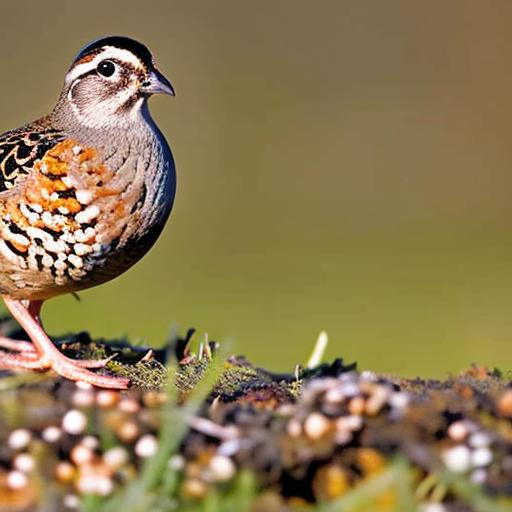Quail keeping is a rewarding and enjoyable hobby that has been gaining popularity in recent years. These small, ground-dwelling birds are known for their gentle nature and low maintenance requirements, making them an ideal choice for both experienced and novice bird keepers. Quail come in a variety of species, including the popular Coturnix quail, Bobwhite quail, and California quail, each with its own unique characteristics and care needs. Whether kept for their eggs, meat, or simply as pets, quail offer a range of benefits to their keepers. In this article, we will explore the various reasons why people choose to keep quail and the many advantages that come with it.
Key Takeaways
- Quail keeping is an enjoyable and rewarding hobby that can be easily integrated into a sustainable lifestyle.
- Quail are low-maintenance pets that require minimal space and can be kept in urban or rural settings.
- Quail are a sustainable food source, providing nutritious eggs and meat for personal consumption.
- Quail can be used for pest control, as they eat insects and help to keep garden and farm pests in check.
- Quail can be used for educational purposes, teaching children and adults about animal care and sustainable living practices.
- Quail can also provide therapy and emotional support, as their gentle nature and soothing sounds can have a calming effect on people.
- Keeping quail offers a wide range of benefits, from sustainable food production to emotional support and education.
Quail as Low-Maintenance Pets
Quail are often chosen as pets due to their low-maintenance nature. Unlike other poultry, such as chickens, quail require minimal space and can be kept in small enclosures or aviaries. They are also relatively quiet birds, making them suitable for urban or suburban environments where noise may be a concern. Additionally, quail are hardy and adaptable, able to withstand a range of temperatures and weather conditions. Their diet consists of commercial game bird feed and fresh water, making them easy and inexpensive to care for. With their gentle disposition and minimal care requirements, quail make wonderful pets for individuals or families looking for a low-maintenance bird to enjoy.
Quail are also known for their entertaining behavior, as they are active and social birds that enjoy interacting with each other and their human caretakers. Their curious nature and amusing antics provide endless entertainment for those who keep them as pets. Watching quail dust bathing, foraging for food, or simply going about their daily activities can be a source of joy and relaxation for many quail keepers. Overall, the low-maintenance nature and entertaining behavior of quail make them an appealing choice for those seeking a unique and enjoyable pet.
Quail as a Sustainable Food Source
In addition to being kept as pets, quail are also valued for their role as a sustainable food source. Quail eggs are highly nutritious, containing more protein and less cholesterol than chicken eggs. They are also rich in vitamins and minerals, making them a healthy choice for those looking to incorporate more nutrient-dense foods into their diet. Quail eggs are often sought after by chefs and home cooks for their delicate flavor and small size, making them a versatile ingredient in a variety of dishes.
Quail meat is another valuable product that these birds provide. With its lean and flavorful characteristics, quail meat is a popular choice for those seeking a sustainable and ethical protein source. Quail can be raised in small spaces and require less feed and resources compared to larger livestock animals, making them an environmentally friendly option for meat production. Additionally, quail are known for their rapid growth and high reproductive rates, allowing for a consistent supply of eggs and meat throughout the year. For individuals interested in sustainable living and self-sufficiency, raising quail for food can be a rewarding and practical endeavor.
Quail for Pest Control
Quail are natural foragers with a diet that includes insects, seeds, and small plants. As a result, they can be valuable allies in pest control efforts. By releasing quail into gardens or agricultural areas, these birds can help to reduce populations of harmful insects and weeds, minimizing the need for chemical pesticides and herbicides. Quail are particularly effective at controlling pests such as ticks, grasshoppers, snails, and slugs, which can be detrimental to crops and gardens.
In addition to their pest control abilities, quail also contribute to soil health through their scratching and pecking behavior. As they move through the soil in search of food, quail help to aerate the ground and distribute organic matter, promoting healthy soil structure and nutrient cycling. This can be especially beneficial in organic farming systems where maintaining soil health is a priority. Overall, the natural foraging behavior of quail makes them valuable partners in sustainable pest management practices.
Quail for Educational Purposes
Quail keeping can also serve as an educational tool for individuals of all ages. For children, observing the life cycle of quail from hatching to adulthood can provide valuable lessons in biology and animal husbandry. Many schools and educational programs incorporate hatching projects using quail eggs as a way to teach students about embryology and the responsibilities of caring for living creatures. These hands-on experiences can foster a sense of empathy and respect for animals while also promoting scientific curiosity and critical thinking skills.
For adults, keeping quail can offer opportunities for learning about sustainable living practices, animal behavior, and agricultural techniques. Many hobbyists find fulfillment in researching and implementing best practices for quail care, including habitat design, nutrition, and breeding management. By sharing their knowledge with others in the community, quail keepers can contribute to the promotion of responsible animal husbandry and environmental stewardship. Overall, the educational potential of quail keeping makes it a valuable tool for fostering learning and understanding about the natural world.
Quail for Therapy and Emotional Support

Quail keeping has been recognized for its therapeutic benefits in promoting emotional well-being and reducing stress. The gentle nature of quail makes them suitable companions for individuals seeking comfort and companionship. Interacting with quail can provide a sense of calm and relaxation, as their peaceful demeanor can have a soothing effect on those who spend time observing or caring for them. For individuals dealing with anxiety or depression, the presence of quail can offer a source of comfort and distraction from negative thoughts.
In addition to their calming presence, quail keeping can also provide a sense of purpose and routine for individuals struggling with mental health challenges. Caring for these birds requires daily attention to feeding, cleaning, and monitoring their well-being, which can help establish a sense of structure and responsibility in one’s daily life. Furthermore, the act of nurturing living creatures can instill feelings of accomplishment and self-worth, contributing to an overall sense of fulfillment and purpose. For these reasons, quail keeping has been increasingly utilized as a form of therapy in settings such as nursing homes, rehabilitation centers, and mental health facilities.
The Benefits of Keeping Quail
In conclusion, the practice of keeping quail offers a wide range of benefits that appeal to individuals with diverse interests and needs. Whether it’s as low-maintenance pets, sustainable food sources, pest control allies, educational tools, or therapeutic companions, quail have much to offer to their keepers. Their gentle nature, entertaining behavior, and practical contributions make them valuable additions to both rural homesteads and urban households alike. As more people seek ways to connect with nature and live more sustainably, the appeal of quail keeping continues to grow. By recognizing the many advantages that come with keeping quail, individuals can discover new opportunities for enjoyment, learning, and personal well-being through their interactions with these remarkable birds.
If you’re considering keeping quail, you may also be interested in learning about the best coop options for chickens. Check out this insightful article on “The Chicken Coop Country Diner” to discover how to create a comfortable and functional living space for your feathered friends. Learn more here about creating the perfect coop for your poultry.
FAQs
What are the benefits of keeping quail?
Quail are a great addition to a homestead or small farm for several reasons. They are low maintenance, provide a sustainable source of eggs and meat, and can help control pests in the garden.
What do quail eat?
Quail are omnivores and eat a diet of seeds, grains, insects, and small invertebrates. They can also be fed commercial quail feed.
How much space do quail need?
Quail require very little space compared to other poultry. A small coop or hutch with a secure outdoor run is sufficient for a small flock of quail.
What are the different breeds of quail?
There are several different breeds of quail, including the Coturnix quail, Bobwhite quail, and California quail. Each breed has its own unique characteristics and suitability for different purposes.
Are quail noisy?
Quail are generally quieter than other poultry, making them a good choice for urban or suburban settings where noise may be a concern.
Are quail easy to care for?
Quail are relatively low maintenance compared to other poultry. They require a clean living environment, regular access to food and water, and protection from predators. With proper care, quail can thrive and provide a sustainable source of eggs and meat.
Meet Walter, the feathered-friend fanatic of Florida! Nestled in the sunshine state, Walter struts through life with his feathered companions, clucking his way to happiness. With a coop that’s fancier than a five-star hotel, he’s the Don Juan of the chicken world. When he’s not teaching his hens to do the cha-cha, you’ll find him in a heated debate with his prized rooster, Sir Clucks-a-Lot. Walter’s poultry passion is no yolk; he’s the sunny-side-up guy you never knew you needed in your flock of friends!







